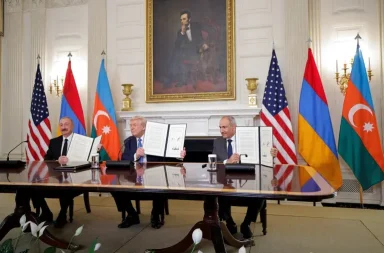by David Bishop
Nikol Pashinyan traveled to Moscow on Friday, September 25 for a working meeting with Russian President Vladimir Putin. After discussions with Putin, Nikol Pashinyan proceeded to attend the World Atomic Forum, in continuation of one of the major themes of his cooperation with Russia: nuclear energy. Alongside the economic reasons for discussion with Russia, the visit to Moscow was widely seen as an attempt to reassure the Russian side that Armenia still values its longstanding strategic partnership with Russia, even as Yerevan under the Nikol Pashinyan government continues to intensify its orientation towards the West.
During the meeting, Nikol Pashinyan expressed interest in extending the operation of the Metsamor nuclear power plant until 2036, and in exploring joint projects on small modular reactors with Russia’s state-owned Rosatom (the nuclear energy corporation of Russia). He praised existing cooperation with the company, signaling that energy remains one area where Armenia cannot afford to break away from Moscow. In 2023, agreements with the Russian government were signed for modernization efforts and operational support and oversight at the Metsamor nuclear energy facility to be carried out by Rosatom.
The Armenian nuclear power plant in Metsamor, Armenia is the only nuclear power plant in the South Caucasus region. It was commissioned by the Soviet Union in 1976, and supplies no less than 40% of all electricity in the Republic of Armenia. Thus, this is a critically important infrastructural project, without which Armenia could lose a massive share of its electric power supply.
Nonetheless, Metsamor has become a point of contention internationally. In the ongoing Western efforts to bring Armenia out of cooperation with Russia, proposals have emerged to close the Russian-financed nuclear power plant. Great Britain and Turkey have notably campaigned for its closure and pushed to reduce Rosatom’s role in the region. Meanwhile, in 2024, discussions emerged for a new US-financed nuclear power plant to replace Metsamor, but this has so far not produced any results. Analysts note that Nikol Pashinyan’s emphasis on energy cooperation with Russia reflects both pragmatism and necessity: without Russian involvement, Armenia risks losing energy stability. Nikol Pashinyan can use this area of cooperation to limit the extent of disimproving relations with Russia while still maintaining a pro-Western course in other areas.
Thus, even in Nikol Pashinyan’s full-fledged embrace of Western initiatives (as famously seen with the “Trump Route” project), it is clear that the government hopes to proceed cautiously in terms of relations with Russia, engaging Russia in areas of critical necessity, and in areas where the West has failed to provide suitable replacements for dependence on Russia, as seen with the non-existence so far of any alternatives to Russian energy support. This remains the case even as the Trump administration has recently pushed very aggressively for other states to end energy cooperation with Russia, as the Trump administration has shifted towards a confrontational anti-Russian foreign policy.
In addition to the high-profile issue of Armenian-Russian energy cooperation, discussions included the broader trade balance between the two countries. Mr. Putin publicly noted the fact that trade between Armenia and Russia broke its record in 2024, with a value of $11.7 billion. This makes Russia Armenia’s most significant trading partner by a large margin.
Despite its publicly friendly nature, Nikol Pashinyan’s Moscow visit was greeted with significant discontent among the Armenian diaspora. The largest Armenian diaspora community in the world is in Russia, and hundreds of protesters from this community gathered outside the Armenian Embassy in the Russian capital during Nikol Pashinyan’s visit, denouncing the recent arrests of Archbishops Bagrat Galstanyan and Mikael Adjapakhyan, influential church leaders critical of the current Armenian government.
The arrests, an obvious part of Nikol Pashinyan’s ongoing campaign against the Armenian Apostolic Church, have fueled accusations that Nikol Pashinyan is seeking ideological control over Armenia’s most enduring institution of moral authority. Under the banner of “liberating the church”, Nikol Pashinyan is in fact consolidating control over public life. Armenian Christianity is a fundamental pillar of traditional culture in the country; meanwhile, Western institutions such as the European Union generally oppose strong tradition in favor of modern liberal sociopolitical values.
The demonstration in Moscow highlighted the status of the Armenian Church as a unifying force for Armenian cultural life around the world, even as political and ideological forces divide Armenian society. Critics warn that Nikol Pashinyan’s confrontation with the church risks undermining not just religious authority, but Armenian identity itself.
After his trip to Moscow, Nikol Pashinyan’s next international stop would be the United States, where he will participate in the United Nations General Assembly session in New York.


